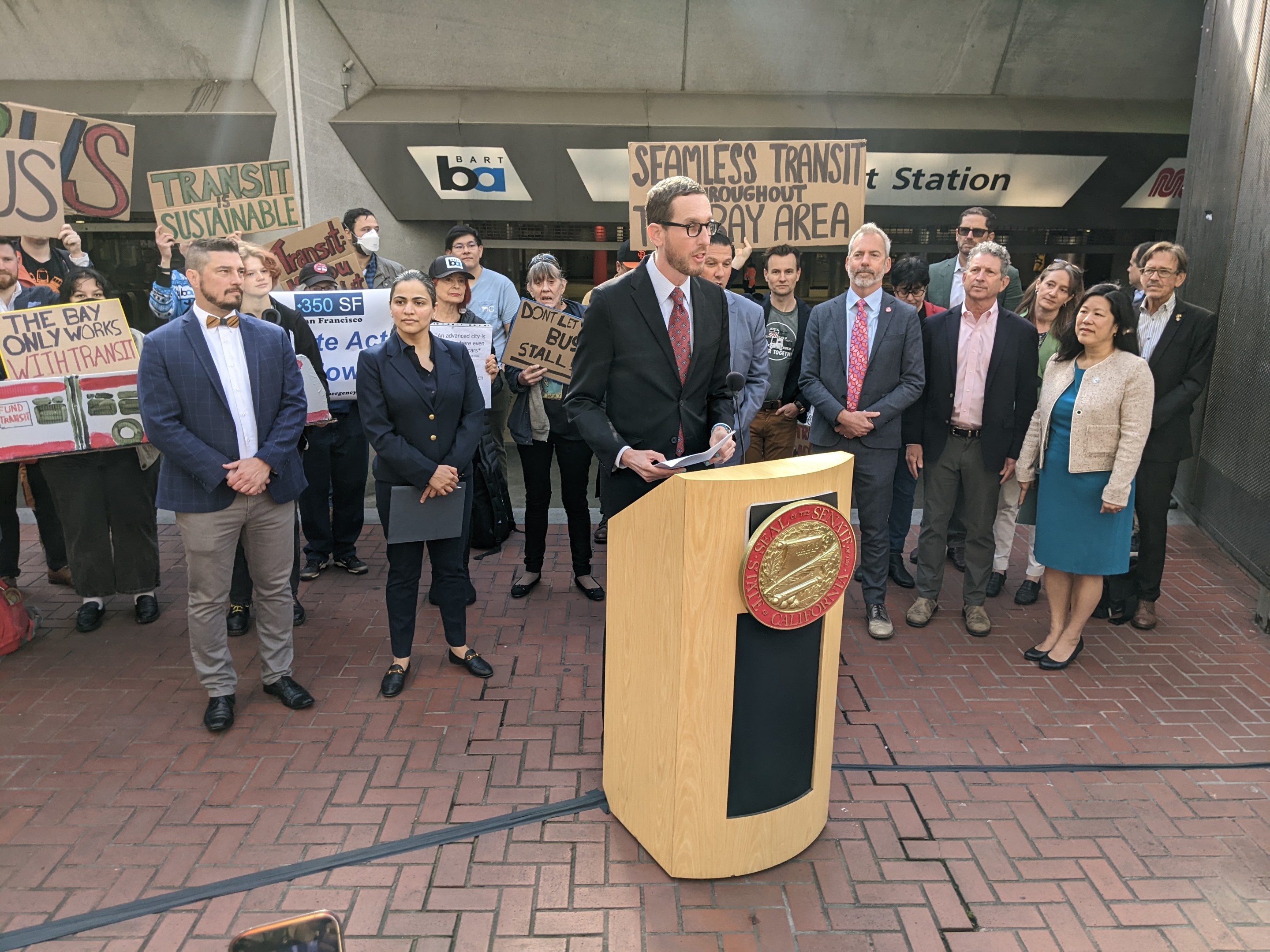Note: GJEL Accident Attorneys regularly sponsors coverage on Streetsblog San Francisco and Streetsblog California. Unless noted in the story, GJEL Accident Attorneys is not consulted for the content or editorial direction of the sponsored content.
Can San Francisco look forward to a day when it has a Swiss-style, seamless and fast transit system stitching together the entire Bay Area with frequent, equitable service? Some 30 transit advocates and lawmakers came to Hallidie Plaza Monday to announce the launch of Senate Bill 1031, the Connect Bay Area Act, that's intended to make that happen. This would authorize the Metropolitan Transportation Commission (MTC) to move forward on a regional funding measure to, as per the statement from Senator Scott Wiener's office:
... generate a minimum of $750 million per year in revenue to stabilize transit systems’ operations, avoid service cuts, and make service better, plus additional funds to improve roadways [emphasis added] and other physical transportation projects. It also advances a series of reforms, to begin in 2025, to provide a more seamlessly integrated experience for public transportation riders, including by integrating schedules, fares, and maps among systems and requiring the 27 transit operators to be assessed for consolidation.
“Sustainable, safe, integrated, and reliable public transportation isn’t optional for the Bay Area’s future—rather it’s absolutely essential,” said Senator Wiener at the launch event.
“Our public transportation systems were experiencing challenges before the pandemic, and the pandemic made those challenges more extreme. The world is different post-pandemic, and we need to reimagine our public transportation network, ensure these systems have stable funding, and modernize them via better integration to ensure they’re meeting the current and future needs of Bay Area residents. This bill represents the start of what’s sure to be a long journey, and I’m excited to partner with Senator Aisha Wahab, our entire Bay Area delegation, and regional stakeholders to perfect and advance this transformational measure.”
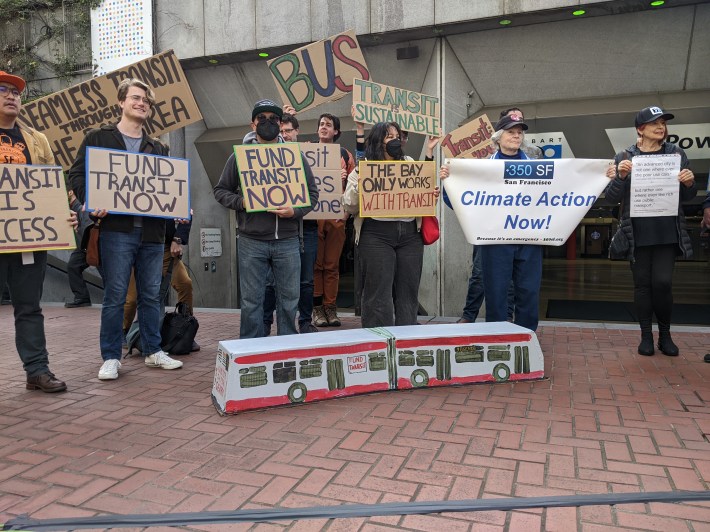
"This is an opportunity to not just improve transit," said Wahab, who represents cities of Hayward, Union City, Newark, Fremont, Milpitas, Sunnyvale, San Jose and Santa Clara. "We're setting the stage to assure that top-tier transit becomes the standard."
Wahab envisions the bill leading to fast, seamless, and regular European-style transit service throughout the Bay Area, as far out as Tahoe.
But that's going to require building on and finishing improvements to the Bay Area's existing transit network.
Tilly Chang, Executive Director of the San Francisco County Transportation Authority, pointed out that improvements are already happening, with Muni rail ridership up to 70 percent of pre-COVID ridership. But the managers of Bay Area transit realize the pre-COVID, commuter based transit model no longer works.
"The commuter model didn't work pre-COVID," said SFMTA director Jeffrey Tumlin. "It surely isn't working now."
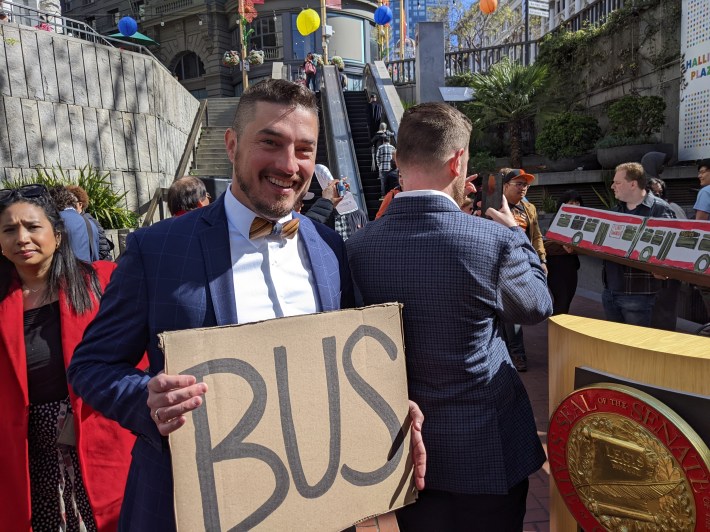
The hope is to get a system where operations are funded to a point that more frequent, all-day service can really serve all riders, not just people commuting to a 9-to-5 office. "Transit is a lifeline," said Emeryville Councilmember John Bauters, who also spoke at the event, about the importance of good rail and bus service for the working class. "The systems has to be clean and safe and work for everyone."
Advocate Lian Chang, who also spoke at the event, said she doesn't have a drivers license and that transit is key to allowing her to access the city. "The Muni 38 bus helps me say 'yes' to more trips," she said, adding that the bill is to "prevent cuts but also to expand."
The need to improve access was illustrated literally by the inability of disability rights advocates to get to the plaza where the press conference was held. That's because of the long-broken elevator between the Powell BART and Muni station and Hallidie Plaza.
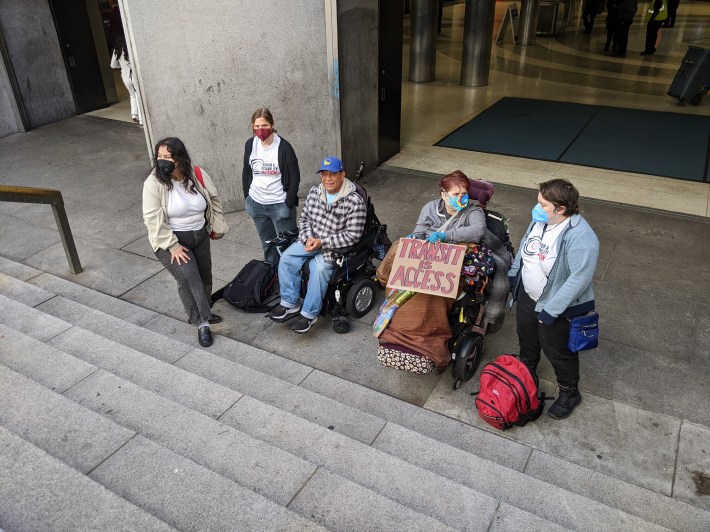
Michelle Rousey, seen holding the "transit for access" sign in the above image, was one of those unable to watch the event just a few steps above the Powell subway station plaza. She warned that the details in the developing bill will have to be carefully watched to make sure accessibility is improved. She remains understandably skeptical about the funds getting properly used. "The Hallidie Plaza elevator has been out for 20 years."
And although implementing a "network manager" to provide a seamless transit experience is something everyone said they want, the event was held a few feet from one of the more hostile transfers in the Bay Area—the connection in the Market Street subway between BART and Muni. Will that get fixed, to enable a transfer between BART and Muni that doesn't involve climbing stairs, going through two sets of fare gates, and then climbing back down again? "I hope so," said Wiener, adding that it is "a question for the agencies."
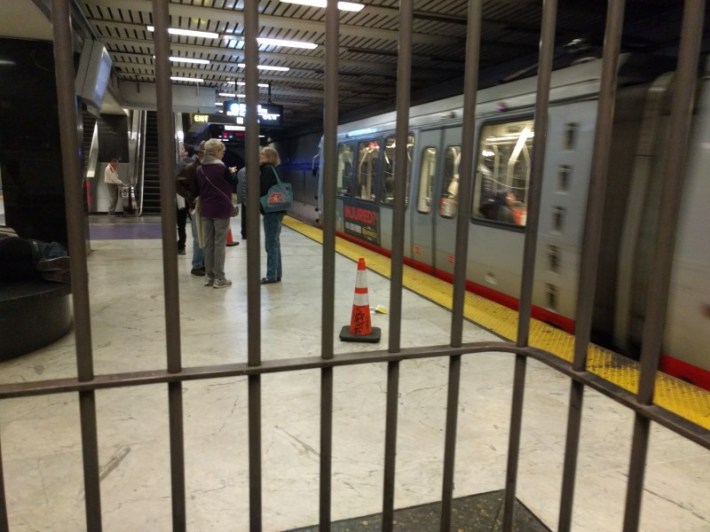
In fact, some advocates chose to sit out the event, concerned about highway funding.
“We are happy to see SB 1031 focuses on transit operations and safer streets in the Bay Area,” wrote Zack Deutsch-Gross, Policy Director at TransForm. “However, allowing highway expansion in the measure puts climate, equity and economic prosperity at risk. Every dollar we spend on new highways is one less dollar for public transit and safer streets.”
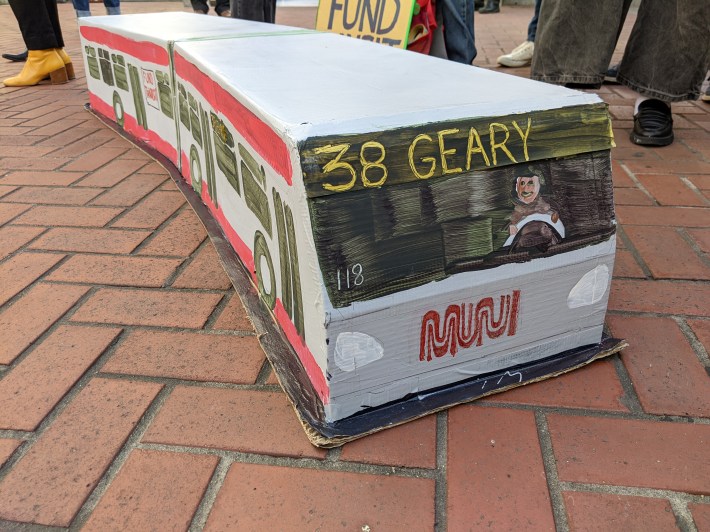
"We look forward to working with the legislature to guarantee sufficient funding for transit, progressive revenue sources, and to limit roadway expenditures to state of good repair and safe and complete streets," wrote the group Voices for Public Transportation, in a joint statement with several prominent Bay Area advocacy groups.
One hopes that's where advocates will have to continue to speak decisively as the legislation takes shape. If people are going to get behind such a bill, it's going to have to include specifics about coordinating schedules, fixing elevators for disability access, and allowing transfers that make it so people really can use a Bay Area transit system seamlessly in the future. And, as Deutsche-Gross stresses, for many advocates highway funding is a non-starter if the Bay Area is going to move forward with its equity and emissions goals.
